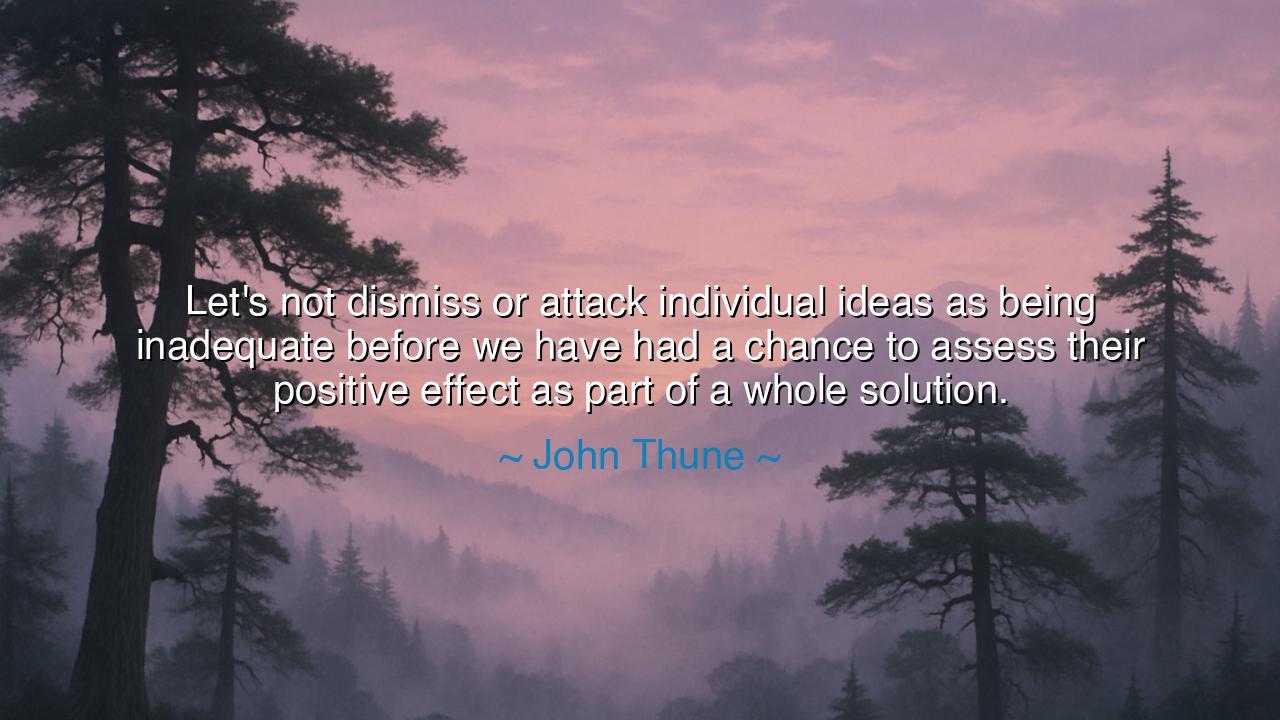
Let's not dismiss or attack individual ideas as being inadequate
Let's not dismiss or attack individual ideas as being inadequate before we have had a chance to assess their positive effect as part of a whole solution.






In the wise words of John Thune, "Let's not dismiss or attack individual ideas as being inadequate before we have had a chance to assess their positive effect as part of a whole solution," we are reminded of the power of patience and perspective in the process of problem-solving. Thune, in his call for a more holistic approach to assessing solutions, speaks to the importance of understanding each element of a greater plan before casting judgment. It is all too easy, in the heat of debate or the rush to act, to dismiss individual ideas without considering how they may contribute to a larger, more comprehensive solution. Thune's words speak to the value of considering the entirety of a concept or plan, understanding that each part may have a vital role to play, even if it seems inadequate in isolation.
The ancients understood this principle well. In Plato’s Republic, the philosopher discusses the importance of looking at the whole rather than the individual parts when seeking truth and justice. The ideal society, according to Plato, is not defined by the success of any one individual or idea but by the balance of all its parts working together. In the same way, Thune’s message urges us to be wary of prematurely judging the parts of a solution without first understanding how they contribute to the greater good. Unity and balance are key in achieving lasting solutions, and a failure to appreciate the value of each individual idea may lead to an incomplete or ineffective resolution.
Consider the example of Leonardo da Vinci, whose genius spanned art, engineering, and science. Many of da Vinci’s ideas were initially dismissed as impractical, and some of his designs remained unrealized during his lifetime. However, upon reflecting on his body of work as a whole, we can see that his seemingly isolated concepts—ranging from flying machines to anatomical drawings—were all part of a much larger vision of understanding the natural world. The world failed to recognize the value of his ideas at the time, but centuries later, the effect of his work as part of the whole has influenced countless fields. His story demonstrates the wisdom of not dismissing individual ideas without considering their larger potential.
In modern times, Thomas Edison offers a compelling example of the power of persistence and the importance of considering every idea as part of a larger whole. Edison’s invention of the electric light bulb was not the result of a single breakthrough, but of years of experimentation and many failed attempts. Early versions of his designs were often criticized, and many ideas that seemed inadequate were abandoned by others. Yet, Edison’s vision was one of incremental progress—he understood that each idea, no matter how flawed, contributed to the eventual solution. His ability to assess the value of ideas in the context of a larger goal and to persevere despite setbacks led to one of the greatest technological advancements in history.
Thune’s emphasis on giving ideas a chance to prove themselves as part of a larger solution also speaks to the importance of collaboration. In ancient Rome, the Senate was a body of diverse thinkers, each bringing their unique perspectives to the table. While debates were often heated, the Romans understood the importance of compromise and dialogue in solving complex problems. The Romans didn’t simply dismiss ideas because they didn’t immediately fit the prevailing narrative; instead, they saw value in disagreement and dialogue as essential elements of finding solutions. Thune’s call for patience in the face of new ideas reflects this ancient wisdom, suggesting that solutions are often found in collaboration rather than isolation.
The lesson that Thune offers is a timeless one: we must resist the urge to judge ideas too quickly and instead embrace the process of evaluating them as part of a broader solution. It is easy to dismiss something as insufficient when we fail to see how it fits into the larger picture. Yet, every idea—no matter how small or seemingly inadequate—may contain the seeds of greatness when examined in context. This lesson is particularly relevant in a world that often values immediate results and quick judgments over the slower, more deliberate process of reflection and collaboration.
In our own lives, we should approach problems, projects, and people with open-mindedness and patience. Whether in the workplace, in politics, or in our personal relationships, we must not rush to conclusions, but rather allow time to see how each piece fits together. Listen to new ideas, assess them without prejudice, and consider how they may contribute to a larger, more meaningful solution. In doing so, we will foster a world where creativity, collaboration, and understanding lead us to better answers—answers that might have otherwise been dismissed as inadequate. Let us embrace ideas in their entirety, seeing them not just for what they are today, but for the potential they hold tomorrow.






AAdministratorAdministrator
Welcome, honored guests. Please leave a comment, we will respond soon